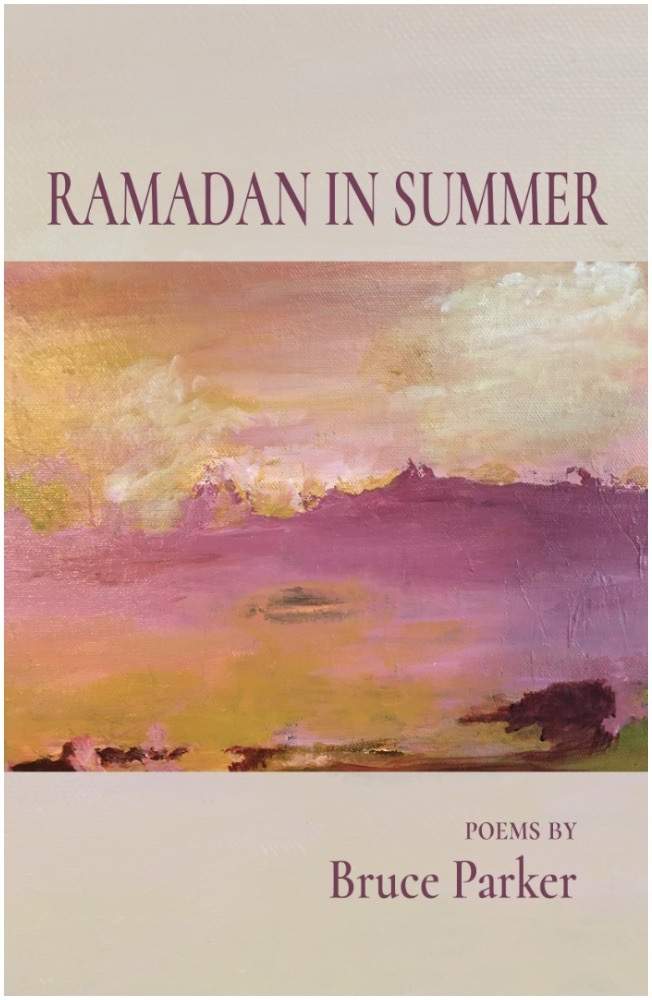Finishing Line Press, 2021, 42 pages $14.99
ISBN 978-1646627240
Available at Amazon

Bruce Parker’s Ramadan in Summer transports us to physical and emotional places with spare authenticity. The first example is in the title poem, “Ramadan in Summer,” when the speaker watches a worker listlessly picking things up and putting them down on the fourth floor of an unfinished apartment building visible from his office in the American Embassy in Islamabad. The worker has been fasting while working in the heat, and we empathize when told the heat was not beautiful…the hunger and dread, was not beautiful. But somehow, we envy the experience when we hear ….but the call to prayer was beautiful. This listlessness, wandering through the incomplete building, is an apt metaphor for any life, and picking up and putting down becomes the theme of Section I: from Fasting to Dining.
By third poem in this section, “All Things Will Change,” the poet equates his mind to a leaf losing its grip/on the body’s twig. This image is inverted from the familiar: the tree doesn’t let the twig go, the twig lets go of the tree. In this case, it’s his family who the poet release[s] [his] hold on/those [he] loves.
This sleight of hand shifts us from the first theme, the passage of time, to the second: futility. Parker tips his hand when he titles an elegy to his friend, the poet Jim Harrison, “Oblivion.” He honors the simplicity of Harrison’s passing as a marvelous nothing of no distress/no struggle, no bliss, but ends with It is there before the symphony begins/there after the poem’s last sigh. Then, in “From My Window I See,” we think we are looking at a hummingbird, but actually we are left studying the space the hummingbird leaves behind. We have taken up our lives for examination and find they are just a pause in some larger scheme.
The sensation of interstices is perfected in “The Mind Gathers and Dissolves.” The poet invites us to imagine salt being stirred into a glass of water. Then we’re in the ocean, in the spray of
a whale, particles sprayed into the universe,
gathered up, spit out
swished and rinsed
by the general rule of entropy
its constituents distributed
unformed, forgotten.
In the second half of the book, II: From Wine to Ice Cream, we are no longer discovering our transience, but trying to suspend it. First, we are introduced to the poet’s love in the first poem, “Wine Dream.” Older and dozing, the poet has dreamt her profile and is startled awake. The tone of the book shifts in the last lines of this poem, Before I sleep again/I will hold you/like wine in the cup. The wine, the hummingbird, the vessel of the cup, the emptiness left behind all come to mind.
We are applying the transience we accepted in the first half of the books and are working to suspend it in “Just a Moment, Please.” The lover arrives and the poet is
speechless
in [his] obedience to
some hunger for
what you mean
and how you are here.
Grateful, yes, but the poet is always aware of transience in everything:
one brief moment
in the universe
and time
is like a shower
over us
the good
dripping off
every moment
running away.
Always meticulous, always circumspect, these universal themes are beautifully addressed in the spare poems Parker has included in the collection. There are two long poems, however. In “Poem Beginning with Erasure,” Parker takes us back to the ocean, the waves, and the tide, but this time contracts it to pistil, petal/cup like hips as we experience a moment with his lover. Despite the presence of other people, the lovers spoon, bifurcated/alone as one/plus one. The space between them again reminiscent of the hummingbird: the space of the poem is filled with imagery, but it’s still space, and will eventually still be empty.
In the poem, “Winter is Coming Sure,” late in the collection, the speaker wakes to meditate on the coming of winter, the passage of seasons, the falling of snow, all of which we have considered before in this book.
How shall I greet
the absence of birds
you upstairs asleep
in the middle of the day
knowing
if you go before…
Ramadan in Summer insists we accept life as a mere pause between two states of oblivion. But after the quiet grace with which Parker has broached this news, we face a new, daunting question. Of course, Parker has an answer.
what is certain
is that winter will come
to think it won’t
is to think the leaves of spring
have run away
without waking up.
The unstated admonition is that we live in the present, and the lines are unforgettable.
What a beautiful, thoughtful chapbook this is. Every word matters even as these poems lay bare a futility we try to ignore. Acceptance is the solace, as Parker reminds us in the close of “Winter is Coming Sure”: winter comes/leaves run—/the door’s the thing.
Reviewer Bio:
Melody Wilson’s work appears in Nimrod, Sugar House Review, The Fiddlehead, and on VerseDaily. She received 2022 Pushcart nominations from Redactions, and Red Rock Review, and was finalist for the Naugatuck Narrative Poetry Contest and semi-finalist for the 2022 Pablo Neruda Awards. She is pursuing her MFA at Pacific University. Find her work at melodywilson.com.
